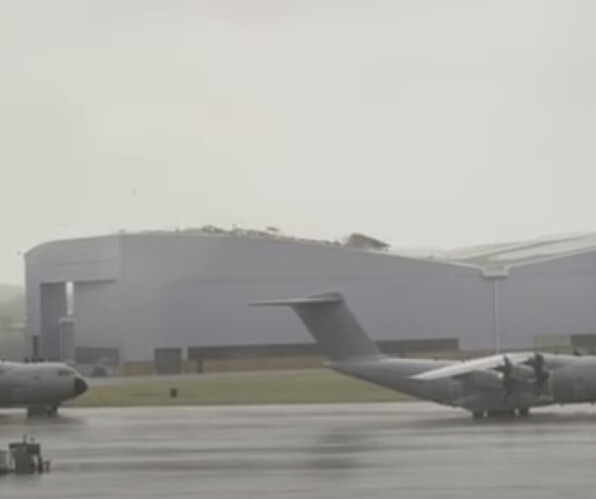It was probably all over by the time the letters from HQAC arrived.
We just carried on as normal. I don’t recall cadets doing clear up work, but then unless it was local by which I mean your sqn you’d never have known until well after the event and it got into the local rag.
HQAC would have had to call RHQs and WHQ would have had to phone OCs at work or home and or send faxes, at a time when not all sqns had phones. Also bear in mind as far as the Met Office was concerned as per Ian McGaskill there was nothing to worry about … the rest as they say is history. But withour the internet etc, it wasn’t the end of the world wall to wall stuff we get now. They were much more less complicated times, with reasonably sedate communications.
The big issue today is Hq can ‘react’ instantly.
But they never seem to unreact or dial back. Always overkill
Michael Fish
That’s not actually true…
The Met Office had issued warnings, including to the MOD that the likely storm damage would require military assistance to the civil authorities.
I don’t think that’s indicative of a “nothing to worry about” attitude.
Even poor old Michael Fish, possibly the most misquoted man in meteorology, did specifically say “the weather will become very windy!”
He was asked if a hurricane would hit and he said no. Technically it wasn’t quite strong enough to be a hurricane
To be fair to Mr Fish he was 100% correct.
Hurricane Floyd, to which he was referring, had been downgraded 2 days before off the coast of Florida and was not going to hit the UK. That comment had nothing to do with the storm we got.
The storm we got was, at the time of his broadcast, an extratropical cyclone (which is not a hurricane, regardless of wind speed) forming in the Bay of Biscay. The problem was that the models predicted that it would pass further South of the UK, with the worst of the wind just brushing the South coast.
As we know, its path brought it much further North.
With regards to his forecast for the UK, well… he wasn’t wrong. It DID get very windy. 
I remember it well.
Ahhh… That was a great little tornado. Though, from last year, rather than today.
There’s longer footage of it somewhere. You can watch the wheelie bin and a trampoline going round and round and round…
It’s a difficult call for an organisation.
'87 is a classic example of how storms can be worse than anticipated.
Whilst everyone immediately thinks of '87, where 18 people died, few people refer to 25 Jan 1990. Although that was a weaker storm than '87 it killed 47 people.
Then, the sustained winds topped about 74 mph with gusts of about 104.
Today we’ve seen gusts around 120 in some areas…
The stop order might have turned out to be overkill in some parts of the country; but when faced with a predication that a particularly strong storm is bringing dangerously high wind, what does one do? Err on the side of caution and risk being the target of grumpy complaints? Or throw caution to the wind (sorry) and risk deaths which might have been avoided?
But there were areas up North and in Scotland that had no warnings at all! It’s very unfair on them. If HQAC had made an announcement saying all areas covered by the red/amber warnings need to stop all activity I’d have been less annoyed by it. But even then, decisions based on weather should be local, not national. This is the sort of thing OC Wings or WExOs should do doing for their areas. Not HQAC.
Frustrating or not, I don’t personally think that I can fault someone for taking the safer option when dealing with an inexact science.
I’d imagine that if devolving the decision to 34 OCs Wing and later finding that one OC had permitted an activity where a cadet was injured or worse as a result; saying “Well… It’s the fault of that OC Wing” wouldn’t exactly cover it.
The least of it would be being held to account. The worst of it would be the knowledge that you could have done something to prevent it.
But that’s exactly how we work, every day. I want to run an activity, it’s approved by someone at wing, not HQAC…
Also does this now set a precedent? Any red warning anywhere in the UK and everything has to stop for 3 days. Even if the warning is only for 6 hours. And also only covers 1 part of the country.
Except that when we work, every day, HQ is not normally in possession of a prediction of severe weather which is due to be worse than previous storms which have killed nearly 50 people…
That’s a bit ‘apples and oranges’ if you ask me.
I disagree to be honest. They either trust the process or they don’t? To put a country wide stop on, for three days, when what was needed was a local stop for 1, maybe 2 days, is pretty insulting imo to a lot of volunteers. If HQAC had said “Any area covered by Amber or Red warnings this weekend are to cancel all their activities” then that would have been relatively okay, as I said above.
But this just screams of a panicked decisions based on no real fact. Someone at HQAC read a Sun or Daily Mail head line saying the UK is going to get battered and cancelled everything. Not actually realising that some areas have a perfectly okay forecast.
There is so much that we do that come with conditions, that scenario technically could happen when it shouldn’t already - it would be no different here to say “cxl your events if xyz, otherwise carry on”.
If the guidance is of strong enough quality, well written and communicated, and easily understood by all, risk is minimised without impacting viable activities where the relevant risks being mitigated against don’t exist.
A response by RAFAC on Twitter says “lessons were learnt” in response to remarks about no action during other previous weather warnings. I don’t know if that was actually a consideration at the time, but I suppose you could categorise that as a near miss if people were out and about falling over in the wind - but if the response to any future near miss of any type is total stop then we won’t be getting much done.
HOWEVER, how many weather warnings and extreme events have we endured where this step was not deemed necessary? What consequences have we actually experienced?
I can foresee an “inclement weather policy” being drafted in the wake of this, which would be sensible as long it’s rational and its implementation is dependent on actual conditions for local activities while (as I said above) I would probably accept forecast for residential using non self-drive hire.
I could almost get on board with stopping for the day (corps wide still seems excessive, but sure, I’ll take it).
But surely you can’t justify also stopping activity for the following two days?
There’s yellow wind warnings out for Monday now - should we anticipate the corps-wide “pause” being extended to cover Monday as well, incase that becomes worse?
Doesnt all these frustrations boil down to the fact no one has explained why the stop order nationally and not what you all want? I get the frustrations but i think alot of these arguments are just fuelling each others now and its just entered a spiral?
Dont know maybe ive just got a skewed opinion on things

